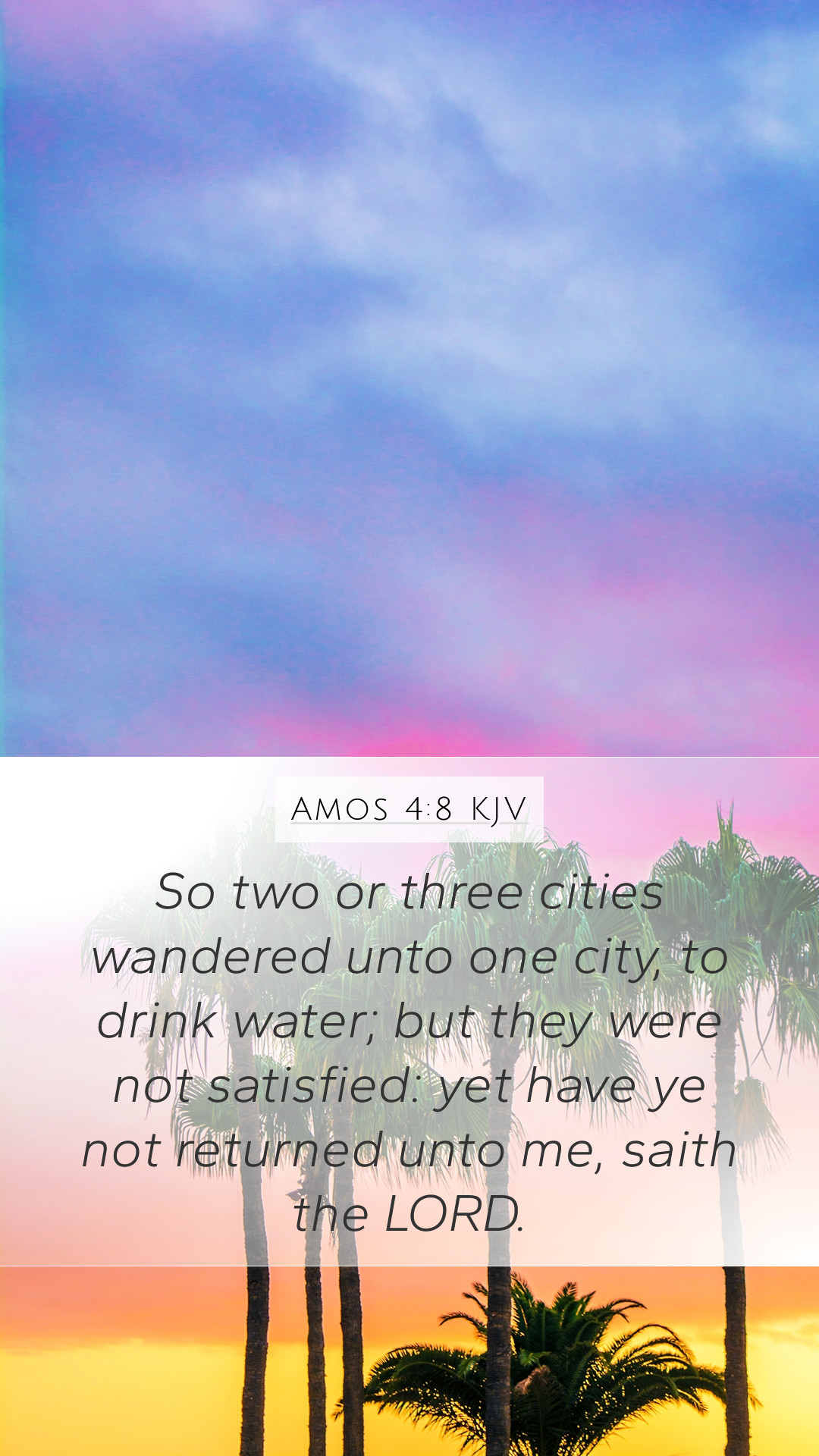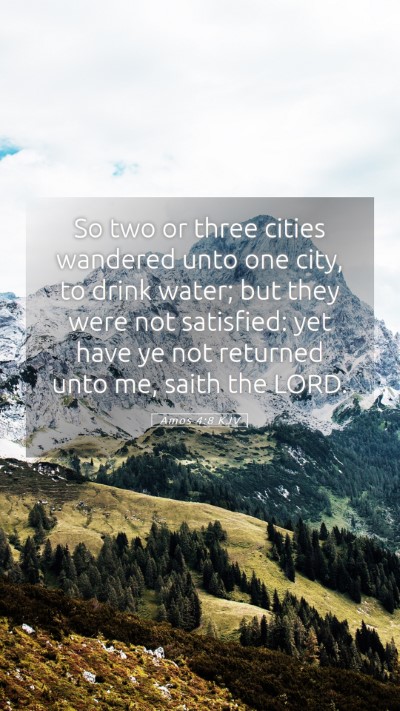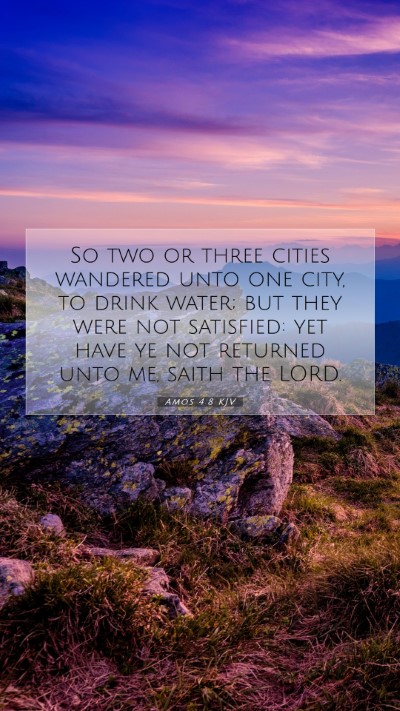Old Testament
Genesis Exodus Leviticus Numbers Deuteronomy Joshua Judges Ruth 1 Samuel 2 Samuel 1 Kings 2 Kings 1 Chronicles 2 Chronicles Ezra Nehemiah Esther Job Psalms Proverbs Ecclesiastes Song of Solomon Isaiah Jeremiah Lamentations Ezekiel Daniel Hosea Joel Amos Obadiah Jonah Micah Nahum Habakkuk Zephaniah Haggai Zechariah MalachiAmos 4:8 Meaning
What is the meaning of Amos 4:8?
So two or three cities wandered unto one city, to drink water; but they were not satisfied: yet have ye not returned unto me, saith the LORD.
Amos 4:8 Bible Verse Meaning
Biblical Exegesis of Amos 4:8
Amos 4:8 states, "So two or three cities wandered unto one city, to drink water; but they were not satisfied: yet have ye not returned unto me, saith the LORD." This verse captures themes of divine judgment, human dissatisfaction, and the call to repentance. The insights from public domain commentaries by Matthew Henry, Albert Barnes, and Adam Clarke provide depth to the understanding of this scripture.
Overview and Context
The book of Amos is one of the minor prophets in the Old Testament, written in a time of moral decay and social injustice in Israel. Amos, a shepherd by trade, was called by God to proclaim His judgment against Israel's sins. This specific verse reflects the dire consequences of their unfaithfulness and their failure to heed God's warnings.
Key Themes Explored
- God's Call to Repentance: The repeated phrase "yet have ye not returned unto me" serves as a poignant reminder of God's desire for His people to turn back to Him despite their failures.
- The Futility of Human Efforts: The imagery of cities wandering in search of water symbolizes the spiritual thirst and dissatisfaction that comes from seeking fulfillment outside of God.
- Consequence of Sin: The context suggests that the consequences of unrepented sin led to physical and spiritual desolation, emphasizing the need for divine restoration.
Commentary Insights
Matthew Henry's Commentary
Henry emphasizes the striking image of cities being unable to find sufficient water, which symbolizes the spiritual drought and neediness of the people. He reflects on how their searching and wandering are futile without turning to God. This serves as a metaphor for the soul's thirst for righteousness that cannot be quenched by worldly means.
Albert Barnes' Commentary
Barnes elaborates on the consequences of Israel's sins leading to such desolation that entire cities were left in search of the basic sustenance of water. He indicates that this imagery portrays God's judgment because they failed to recognize their need for Him, reinforcing the need for repentance and acknowledgment of their spiritual condition.
Adam Clarke's Commentary
Clarke discusses the physical context behind the verse, noting that water scarcity in a civilization largely dependent on agriculture is a severe judgment. He argues that God's patience has limits, and the people’s failure to repent reveals a hardened heart towards God's call. His commentary underscores the urgency for individuals and nations alike to recognize divine accountability.
Understanding Scripture Through This Verse
Amos 4:8 is rich with meaning and application for today's reader. It serves as a reflection on human struggle and the pursuit of satisfaction through worldly endeavors that ultimately leave one empty. It challenges believers to assess their own lives: Are they running from city to city, spiritually thirsty, yet unwilling to turn to God for fulfillment?
Application to Daily Life
In our daily lives, individuals often face moments where they feel spiritually thirsty or unfulfilled. This verse can guide personal reflection and prayer, inviting a return to God, who alone can satisfy. It encourages individuals to avoid wandering through life's various distractions and to seek God earnestly in faith.
Cross References
- Isaiah 55:1-2: An invitation from God for the thirsty to come without cost for abundant life.
- Jeremiah 2:13: A call to recognize the neglect of the living water offered by God.
- Revelation 21:6: The promise of the water of life to those who thirst.
Conclusion
Amos 4:8 serves as a powerful reminder of the consequences of turning away from God and the ultimate need for repentance and restoration. The insights drawn from its commentary shed light on the importance of recognizing our spiritual thirst and responding to God's call.
Further Study
For those wishing to dive deeper into the meanings of Bible verses, consider exploring:
- Bible study resources that offer tools for understanding difficult passages.
- Online Bible study sessions focusing on the minor prophets.
- Bible study lessons that cover the themes of judgment and repentance in the Old Testament.


